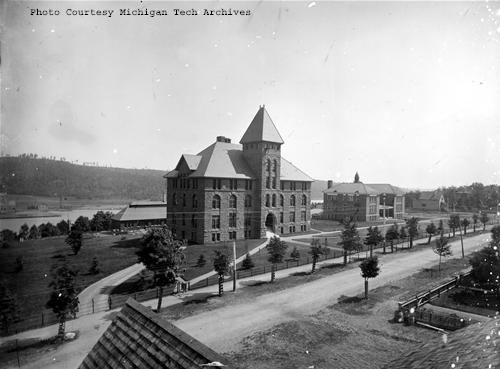An Interior Ellis Island (Print Version)
Setting the Scene
The Project
Close
| Michigan Mining School (Michigan Tech) Campus 1895-1901 Image #: MTU Neg 00855 |
The Interior Ellis Island project was designed to create significant public humanities resources that explore the rich ethnic and cultural history of Michigan’s Copper Country, a four-county region in the Western Upper Peninsula known for its historic copper mining. The project was completed by the J.R. Van Pelt Library at Michigan Technological University, the university founded in 1885 to educate mining engineers for the local district. The Interior Ellis Island project received private support from Dr. Robert and Ruth Nara and a significant grant from the Michigan Humanities Council, an affiliate of the National Endowment for the Humanities.
Information developed through the project is shared through three grant-supported products and activities: 1) this series of “Interior Ellis Island” web pages, 2) two thousand digital objects added to the “Keweenaw Digital Archives,” a searchable web-based image server, and 3) a one-day symposium entitled “An Interior Ellis Island: Ethnic Diversity and the Peopling of Michigan’s Copper Country,” which was held in Houghton on July 1, 2006.
A team of historians and archivists created the content for these web pages and assisted in the selection of images for the digital archives. At its completion, the project will share resources from more than a dozen resource partners in the region, including museums, archives, libraries and Native American organizations. It also includes input from K-12 educators from several schools in the local area, investing the products with perspectives applicable to an education setting. The symposium attracted more than 150 attendees, while the web resources will continue to reach a large and varied audience of students, genealogists and members of the general public.
The project has encouraged a collaborative effort between historians and a variety of cultural, educational and community-based organizations and institutions across Michigan’s Copper Country. Through the symposium and web resources, the project has improved access to important humanities resources and encourages their use off-site from their home institutions.
